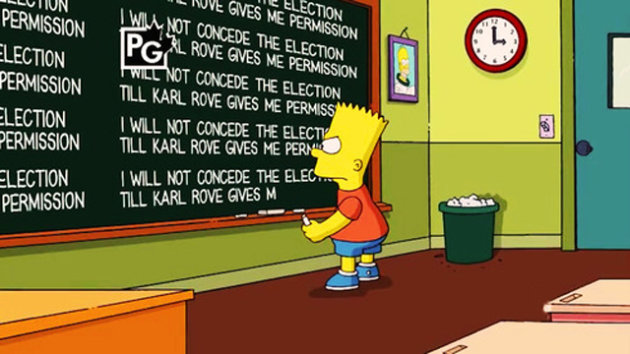Alec Baldwin: But in your profession, in the political professional class, the punditocracy, whatever you want to call it, now we have a whole network which is very, very tilted in one direction. Did you see that coming?
George Will: You have two – you have two whole networks. Well, look, 30 years ago – CNN was founded in '81, I think – 30 years ago at the dinner hour in this country, 80 percent of all television sets in use were turned to Cronkite, Chancellor, and Peter Jennings. Today we have this cornucopia of news sources. People define journalism on their own terms, get it on their own time.
I was told by an activist in South Carolina during the primary this year that a survey showed that 72 percent of all Republican primary voters in South Carolina get all, not most, all of their news from Fox News. When a Republican candidate buys an ad on Fox News, he's not broadcasting, he's narrowcasting right into Republican voters.
Now, in a way, this too is a reversion. When the party system developed in the 1790s and early 1800s, American newspapers were largely factional papers. Some of them were paid by the parties. So we may look back upon the, some would say the pretense of objective journalism or nonpartisan journalism as an episode, a parenthesis in our national history. [Emphasis Mine.]
- Here's the Thing Podcast, September 24, 2012
There are things I like about George Will. He's an interesting, smart guy. He often has a different take on political situations than the Republican party line. And I like smart people who aren't afraid to show their smarts - so in the same way that I have an appreciation for Justice Scalia, I have an appreciation for George Will. But this statement he made - in a generally good podcast episode - made me seriously upset.
I'll try to explain why.
1. Objectivity and Truth Are an Important Part of Our Political Culture. In a Democracy, Objective Truth and Rule of Law provide the basis for the democratic culture. Democracy works best where there is a solid political culture based on: individual freedoms, trust in institutions, and belief that the people of a country will ultimately make the best decisions for that country's governance. When the government and press are partisan rather than objective, how can people who disagree all trust in their democracy?
Let's look at what happens when countries do not have the underpinnings of a democratic culture:
- Russia - Look at Russia and the other former states of USSR after the fall of the Soviet Union. We have seen lots of corruption, lots of economic upheaval, and Russia keeps coming back to Putin, who has some serious dictatorial tendencies and who worked for years for the KGB. One of the reasons Russia is still having serious trouble in its democracy is that the political culture to support the democracy didn't come first. The same can be said for countries that overthrow dictators...
- Egypt - One reason I think it's still too early to tell whether the "Arab Spring" was a good thing or not is that what often happens in the wake of a revolution is that the people just want stability and a strong leader. That often leads to a new dictatorship, or a military state which then becomes a dictatorship. So, for example, we have Mohammed Morsi, who was elected - but who has responded to his success in helping to negotiate a cease-fire between Israel and Hamas by making a huge grab of executive power that caused violent protests on the streets.
- USA - A couple of good examples of how a solid democratic culture and objectivity has helped America in tough times:
- When FDR tried to pack the Supreme Court, after being hailed as savior-figure and given huge deference at the beginning of his term to act to stop the Great Depression, he was opposed. He failed to make the grab, because political leaders on both sides of the aisle refused to go along. The president was partisan, the Congress rose above.
- When the Supreme Court ordered Richard Nixon to turn over the secret tapes that showed his complicity in Watergate, Nixon turned the tapes over. Nixon did a lot of things to undermine public faith in our government, but this was something he did that affirmed the rule of law, and the fact that the executive is subject to limitation by the judiciary.
The best gift George Washington gave America (and arguably the world) was the peaceful transition of democratic power. For democracy to thrive, you have to have a culture that supports the idea of power being legitimate only when it derives from the people, and power being subject to the actual will of the people. In order to build that kind of culture, the people have to feel confident in the information they are getting, and in the ability of governments and elections to be fair and objective. Truthiness undermines our belief in the system.
2. How Did We Get Here? In a government based on consensus, agreement on established facts provides the basis for legislation and governance. Our government is based on checks and balances, yes. But it is also based on the theory that the best legislation for the long run will the the legislation that a lot of people can agree on - that's why we have such a slow, at times arduous, legislative process. Where do we start that process? From facts. That's the theory behind Congressional Committees - that legislators of both parties will work together to gain knowledge and expertise on given subjects and use that knowledge and expertise to develop relevant and needed legislation. That only works when you can establish a common language.
 |
| Bob Michel (R), with Tip O'Neill (D) and Reagan |
There has been a lot of pressure for Republicans to think in a more ruthless, partisan way to "win" the legislative battles over the last 20-or-so years.
It largely originated with Newt Gingrich and a bunch of folks like Grover Norquist (Americans for Tax Reform), and Ralph Reed (Christian Coalition) - and continued with Stephen Moore (Club for Growth), and Tom Delay. These guys believed that the "old-fashioned" way of Rs like House Minority Leader Bob Michel - who tended to act in a more circumspect, gracious manner, and socialized with Democrats (as was the norm in that time) - was causing Rs to "lose."
 |
| Gingrich, "Winning." |
Hence the Contract with America.
And the K Street Project (here's the short version of what this did... and here's the long one).
And wordsmiths like Frank Luntz (creator of the "Death Tax") who specialize in a Madison-Avenue-Style of rhetoric, largely about branding over truth, and persuasion instead of information/explanation.
Democrats are not immune to this line of thinking. LBJ was often successful because he would say completely opposite things to different groups of legislators, and he would talk about "believing what you sell" - earnestly convincing yourself that you believe whatever you are saying to convince the audience you are currently addressing.
In some ways, that's harder now - because there are so many ways to be caught when you say different things to different audiences - see Romney's 47%.
But good legislation doesn't come out of partisan game-playing. And partisan game-playing leads to decisions like "hey, let's just stop everything the president wants to do, even if it's good for the country... because we don't want him to get credit for anything at all." Or "we don't want people to vote if they aren't going to vote for us." That's bad for the country.
Winning an election cannot be more important than governing the country. By making those kinds of decisions, we undermine our own political culture, and the trust in our government and our press. That's what Fox News and the "Reagan Revolution" have done: they've undermined our belief in Truth, Justice, and the American Way, by eroding our faith in the objectivity of the press, the objectivity of the government, and the truth of science and shared facts.
3. When You Don't Aim for Objectivity in Journalism, You Get This:
...and...
Partisanship cannot be the end-all and be-all. There is value in objectivity and truth. Truth unites us.




This is why I try to get my news only from The Onion. (Just like the Chinese government - http://www.washingtonpost.com/blogs/compost/post/state-run-newspaper-picks-up-onion-kim-jong-un-hoax/2012/11/27/cad5c42c-38a2-11e2-b01f-5f55b193f58f_blog.html)
ReplyDeleteGetting your news from the Onion is good. But only if you also get news from The Daily Show, Colbert, and SNL.
ReplyDeleteYou'd think China would have learned by now - didn't this happen before with another Onion article? Or was that North Korea? One of those censor-happy countries.